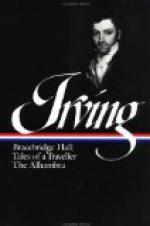When the parson had finished a rapturous eulogy on this most curious and entertaining work, he drew forth from a little drawer a manuscript lately received from a correspondent, which perplexed him sadly. It was written in Norman-French in very ancient characters, and so faded and mouldered away as to be almost illegible. It was apparently an old Norman drinking song, that might have been brought over by one of William the Conqueror’s carousing followers. The writing was just legible enough to keep a keen antiquity hunter on a doubtful chase; here and there he would be completely thrown out, and then there would be a few words so plainly written as to put him on the scent again. In this way he had been led on for a whole day, until he had found himself completely at fault.
The squire endeavoured to assist him, but was equally baffled. The old general listened for some time to the discussion, and then asked the parson if he had read Captain Morris’s or George Stephens’s or Anacreon Moore’s bacchanalian songs; on the other replying in the negative, “Oh, then,” said the general, with a sagacious nod, “if you want a drinking song, I can furnish you with the latest collection—I did not know you had a turn for those kind of things; and I can lend you the Encyclopaedia of Wit into the bargain. I never travel without them; they’re excellent reading at an inn.”
It would not be easy to describe the odd look of surprise and perplexity of the parson at this proposal; or the difficulty the squire had in making the general comprehend, that though a jovial song of the present day was but a foolish sound in the ears of wisdom, and beneath the notice of a learned man, yet a trowl written by a tosspot several hundred years since was a matter worthy of the gravest research, and enough to set whole colleges by the ears.
I have since pondered much on this matter, and have figured to myself what may be the fate of our current literature, when retrieved piecemeal by future antiquaries, from among the rubbish of ages. What a Magnus Apollo, for instance, will Moore become among sober divines and dusty schoolmen! Even his festive and amatory songs, which are now the mere quickeners of our social moments, or the delights of our drawing-rooms, will then become matters of laborious research and painful collation. How many a grave professor will then waste his midnight oil, or worry his brain through a long morning, endeavouring to restore the pure text, or illustrate the biographical hints of “Come tell me, says Rosa, as kissing and kissed;” and how many an arid old book-worm, like the worthy little parson, will give up in despair, after vainly striving to fill up some fatal hiatus in “Fanny of Timmol!”
[Illustration: “Come, tell me, says Rosa, as kissing and kissed”]
Nor is it merely such exquisite authors as Moore that are doomed to consume the oil of future antiquaries. Many a poor scribbler, who is now apparently sent to oblivion by pastry-cooks and cheesemongers, will then rise again in fragments, and flourish in learned immortality.




